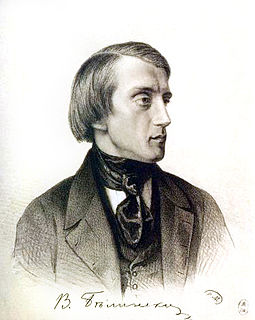
The Communist Manifesto is an 1848 political pamphlet by the German philosophers Karl Marx and Friedrich Engels. Commissioned by the Communist League and originally published in London just as the Revolutions of 1848 began to erupt, the Manifesto was later recognised as one of the world's most influential political documents. It presents an analytical approach to the class struggle and the conflicts of capitalism and the capitalist mode of production, rather than a prediction of communism's potential future forms.

The Neue Rheinische Zeitung: Organ der Demokratie was a German daily newspaper, published by Karl Marx in Cologne between 1 June 1848 and 19 May 1849. It is recognised by historians as one of the most important dailies of the Revolutions of 1848 in Germany. The paper was regarded by its editors and readers as the successor of an earlier Cologne newspaper, the Rheinische Zeitung, also edited for a time by Karl Marx, which had been suppressed by state censorship over five years earlier.

"The Civil War in France" was a pamphlet written by Karl Marx, as an official statement of the General Council of the International on the character and significance of the struggle of the Communards in the Paris Commune.

While Marxists propose replacing the bourgeois state with a proletarian semi-state through revolution, which would eventually wither away, anarchists warn that the state must be abolished along with capitalism. Nonetheless, the desired end results, a stateless, communal society, are the same.
The relationship between Pope Benedict XV and Russia occurred in a very special context, that of the 1917 Russian Revolution. The seizure of power by the Bolshevik revolutionaries unleashed an unprecedented wave of persecutions against the Roman Catholic Church and the Russian Orthodox Church, who were forced to cooperate during a time of distress.
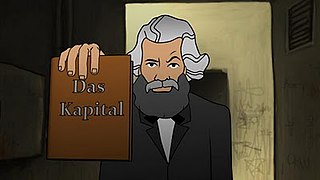
Karl Marx and his ideas have been represented in film in genres ranging from documentary to fictional drama, art house and comedy.
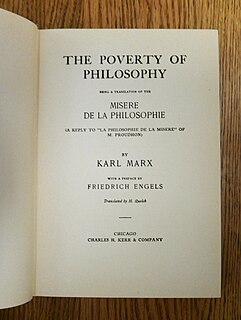
The Poverty of Philosophy is a book by Karl Marx published in Paris and Brussels in 1847, where he lived in exile from 1843 until 1849. It was originally written in French as an answer to the economic and philosophical arguments of French anarchist Pierre-Joseph Proudhon set forth in his 1846 book The System of Economic Contradictions, or The Philosophy of Poverty.

Moses (Moshe) Hess was a French-Jewish philosopher and a founder of Labor Zionism. His socialist theories, predicated on racial struggle, led to conflict with Karl Marx and Frederick Engels. As a devoted Spinozist, Hess was profoundly influenced by Spinoza's life and philosophy.

Classical Marxism refers to the economic, philosophical and sociological theories expounded by Karl Marx and Friedrich Engels as contrasted with later developments in Marxism, especially Leninism and Marxism–Leninism.

The Cologne Communist Trial took place in 1852 in Cologne, Germany, and was conducted by the Prussian government against eleven members of the Communist League who were suspected of having participated in the 1848 uprising. The trial lasted from October 4 to November 12, and when it was over the Communist League dissolved itself. Seven of the eleven were sentenced to prison terms of up to six years.

Marxist literary criticism is a loose term describing literary criticism based on socialist and dialectic theories. Marxist criticism views literary works as reflections of the social institutions from which they originate. Most Marxist critics who were writing in what could chronologically be specified as the early period of Marxist literary criticism subscribed to what has come to be called "Vulgar Marxism." In this thinking of the structure of societies, literary texts are one register of the Superstructure, which is determined by the economic Base of any given society. Therefore, literary texts are a reflection of the economic Base rather than "the social institutions from which they originate" for all social institutions, or, more precisely human social relationships, are in the final analysis determined by the economic Base. According to Marxists, even literature itself is a social institution and has a specific ideological function, based on the background and ideology of the author.
Revolutionary socialism is the socialist doctrine that social revolution is necessary in order to bring about structural changes to society. More specifically, it is the view that revolution is a necessary precondition for a transition from capitalism to socialism. Revolution is not necessarily defined as a violent insurrection; it is defined as seizure of political power by mass movements of the working class so that the state is directly controlled or abolished by the working class as opposed to the capitalist class and its interests. Revolutionary socialists believe such a state of affairs is a precondition for establishing socialism and orthodox Marxists believe that it is inevitable but not predetermined.
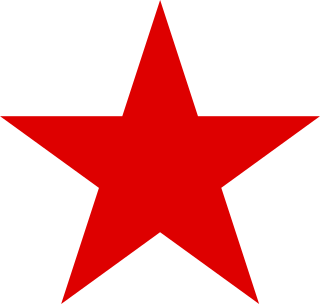
The political slogan "Workers of the world, unite!" is one of the most famous rallying cries from The Communist Manifesto (1848) by Karl Marx and Friedrich Engels. A variation of this phrase is also inscribed on Marx's tombstone. The essence of the slogan is that members of the working classes throughout the world should cooperate to achieve victory in class conflict.

Principles of Communism is a brief 1847 work written by Friedrich Engels, the co-founder of Marxism. It is structured as a catechism, containing 25 questions about communism for which answers are provided. In the text, Engels presents core ideas of Marxism such as historical materialism, class struggle, and proletarian revolution. Principles of Communism served as the draft version for the Communist Manifesto.

The Communist League was an international political party established on June 1, 1847 in London, England. The organisation was formed through the merger of the League of the Just, headed by Karl Schapper and the Communist Correspondence Committee of Brussels, Belgium, in which Karl Marx and Friedrich Engels were the dominant personalities. The Communist League is regarded as the first Marxist political party and it was on behalf of this group that Marx and Engels wrote the Communist Manifesto late in 1847. The Communist League was formally disbanded in 1852, following the Cologne Communist Trial.
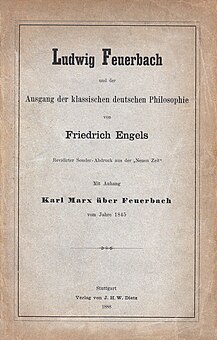
The "Theses on Feuerbach" are eleven short philosophical notes written by Karl Marx as a basic outline for the first chapter of the book The German Ideology in 1845. Like the book for which they were written, the theses were never published in Marx's lifetime, seeing print for the first time in 1888 as an appendix to a pamphlet by his co-thinker Friedrich Engels. The document is best remembered for the epigrammatic 11th thesis and final line: "Philosophers have hitherto only interpreted the world in various ways; the point is to change it."
Karl Schapper was a German socialist and labour leader. He was one of the pioneers of the labour movement in Germany and an early associate of Wilhelm Weitling and Karl Marx.

The Tomb of Karl Marx stands in the Eastern cemetery of Highgate Cemetery, north London, England. It commemorates the burial sites of Marx, of his wife, Jenny von Westphalen, and other members of his family. Originally buried in a different part of the Eastern cemetery, the bodies were disinterred and reburied at their present location in 1954. The tomb was designed by Laurence Bradshaw and was unveiled in 1956, in a ceremony led by Harry Pollitt, the General Secretary of the Communist Party of Great Britain, which funded the memorial. The tomb consists of a large bust of Marx in bronze set on a marble pedestal. The pedestal is inscribed with quotes from Marx's works including, on the front, the final words of The Communist Manifesto, "Workers of all lands unite". Since its construction, the tomb has become a place of pilgrimage for followers of Marxist theory. It has also been a target for Marx's opponents, suffering vandalism, and two bomb attacks in the 1970s. It is a Grade I listed structure, the highest listing reserved for buildings and structures of "exceptional interest".







